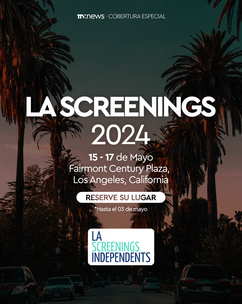The event hosted its twenty-ninth edition in Montevideo, Uruguay, this Thursday, April 20.
The Intellectual Property Summit closed its twenty-ninth edition in Montevideo, Uruguay, this Thursday, April 20.
The event is organized by LAAPIP (Latin America Anti-Piracy & Intellectual Property Consulting) and TTVNews, sponsored by LaLiga and the Alliance Against Audiovisual Piracy as Main Partners, Alliance of Creativity and Entertainment as Platinum Partner, and Cervieri Monsuárez and CALPYC as Supporters Institutional.
Focusing on the importance of the regulatory framework in the protection of Intellectual Property, the event brought together local and international authorities, operators and brands to discuss piracy.
ACE KEYNOTE: ILLEGAL STREAMING SITES, A CHALLENGE IN URUGUAY
The day began with a presentation by Ana Sousa (ACE), in which she highlighted that “Uruguay has three times more access to illegal sites compared to Ecuador, which is five times greater in terms of population.”
In other local data, she highlighted that in the top 25 illegal streaming sites, 11.2 million monthly visits are made from Uruguay, which represents 3% of the total audience received by these services.
In Latin America digital piracy causes losses of US$733 million per year, according to data from the Center for Telecommunications Studies in Latin America.
ALLIANCE KEYNOTE: ONLINE PIRACY WITH HIGH FIGURES IN THE COUNTRY
The event continued with the keynote by Jorge Bacaloni (Alliance Against Audiovisual Piracy), who expressed that the good Internet connectivity in the country causes, in part, the percentage of online piracy to be high.
Among other data, the executive highlighted:
– Online piracy: 37% of households that have broadband in the country consume online piracy.
– According to data from IPSOS, 56% of the online population consumes piracy.
– Traditional TV piracy: 18% of households consume illegal Pay TV.
AUDIOVISUAL PANEL: “EVERY PIRATE SERVICE TAKES THE CONTENT OF A LEGAL SERVICE”
In the Audiovisual Panel, Washington Melo (CUTA), Eduardo Marguery (DIRECTV) and María Mariño (Nagravisión) spoke, moderated by Francisco Escutia (LAAPIP). Maria Mariño emphasized the importance of understanding where the illegal content comes from: “Every pirate service takes the content of a legal service, in addition to the fact that there are pirate services that are mounted on top of other pirate services.”
Washington Melo focused on the trend of falling subscribers and that the industry should be self-critical. “If I say that piracy is responsible for that, I’m right, but I think it would be oversimplifying. I think our industry has to make a strong self-criticism regarding how we have developed this business in recent years and how we have encouraged and favored the growth of piracy. I think that one of the main problems for which the business model of the cable operators is a model that is in decline is due to the conduct of some content providers, who charge exorbitant prices”, he explained.
“There is another type of piracy that is the one in which the final consumer does not know that he is participating in something, which also influences tax collection, anti-competitiveness and jobs; it is about the under-declaration”, highlighted Eduardo Marguery.
TAG KEYNOTE: WHAT ABOUT AD PIRACY?
From London, Nick Stringer of the Trustworthy Accountability Group, an international self-regulatory body to combat criminal activity and promote brand safety in digital advertising, said that 43% of companies certified by TAG Brand Safety are applying the standard at a national level.
The company alerts brands (and their agencies) to the placement of ads on pirate sites in Europe. To date, 86% of brands contacted have reduced ad impression on pirate sites in Europe.
LALIGA KEYNOTE: THE LIVE 90 MINUTE CHALLENGE
On behalf of LaLiga, Juan Rotger explained that “the main sources of piracy that concern us are social networks, mobile applications, iptv cardsharing, online marketplaces and streaming websites”.
In addition to his software -Lumiere to detect content infringement; Marauder to detect illegal streaming and Blackhole for illegal IPTV and cardsharing-, LaLiga relies on its technology subsidiary, LaLiga TECH, with which it detects infringements worldwide automatically 24/7. “Since August 2022, more than 6,000 website and IPTV platforms have been blocked,” reported Guillermo Rodríguez (LaLiga TECH).
PANEL OF AUTHORITIES: URUGUAY, THE FEATURED COUNTRY IN LATAM
The Summit said goodbye to a panel of authorities made up of Guzmán Acosta y Lara (DINATEL), Julia Staricco (First Instance) and Belén Camejo (Scientific Police), moderated by Virginia Cervieri (CALPYC), in which the country was recognized and highlighted for its progress in the legal framework.
“Uruguay has been working in Intellectual Property for many years. We all know about technological advances, how it advances at a pace that leaves the law behind.
Judicial times go at a speed, but in the audiovisual sector where technology goes faster it is much easier to globalize the piracy of an audiovisual right. Uruguay has been having a strong fight in this sense. The important thing is to have collaboration. The government began to act and we proposed regulations in the Budget Law”, highlighted Guzmán Acosta y Lara.
Meanwhile, Belén Camejo of the Scientific Police, added: “Although criminalistics is our basic science, over the years other specialties have emerged such as documentology and audiovisual piracy, which for us is a challenge, to continue updating, growing and reaching other areas; this speaks of institutional growth”.












